Changing patterns of society Changing patterns of

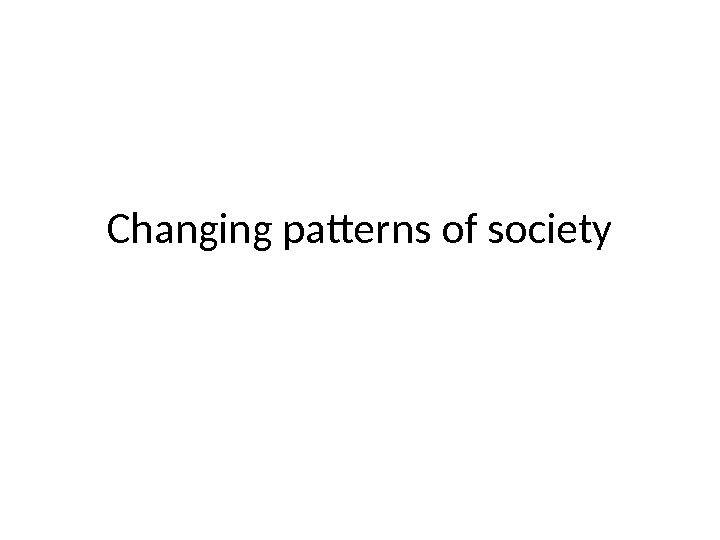

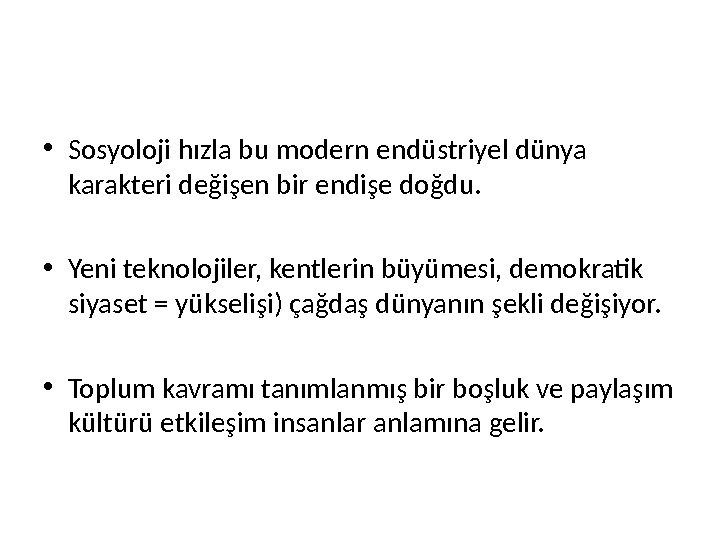
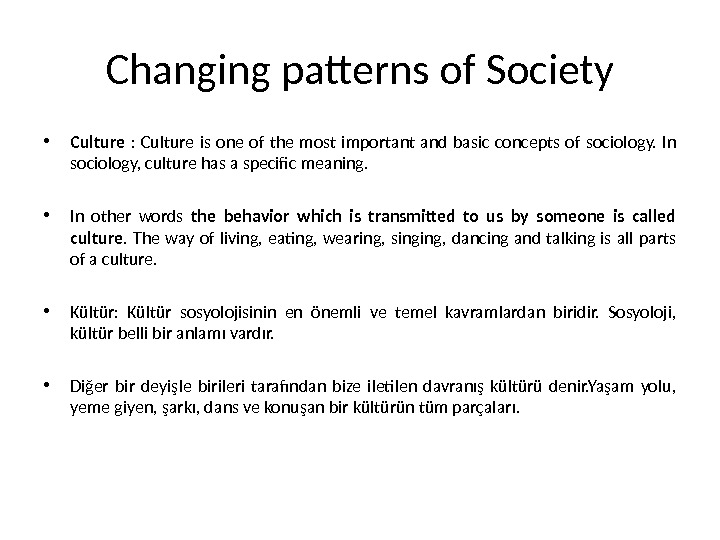

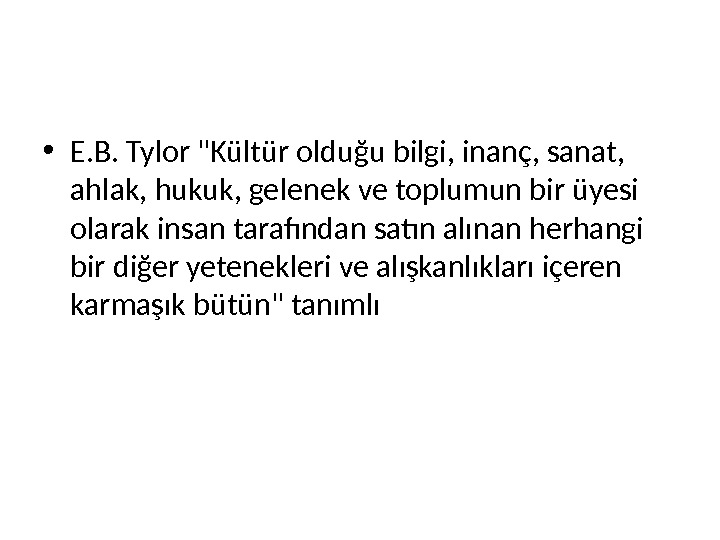
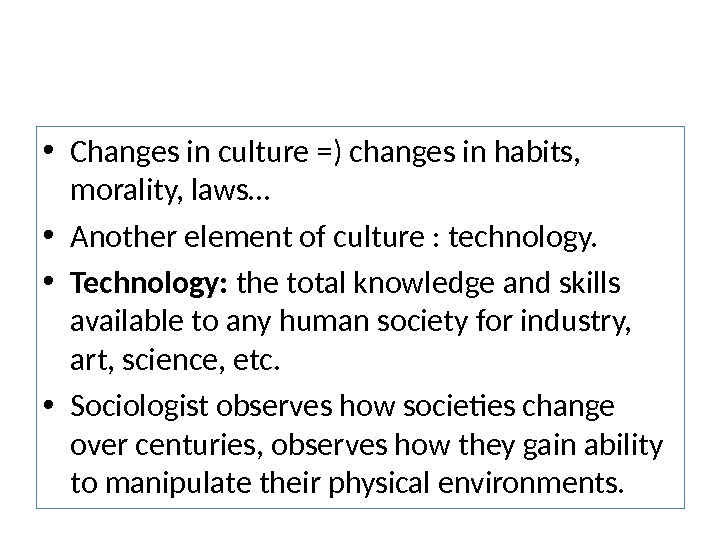
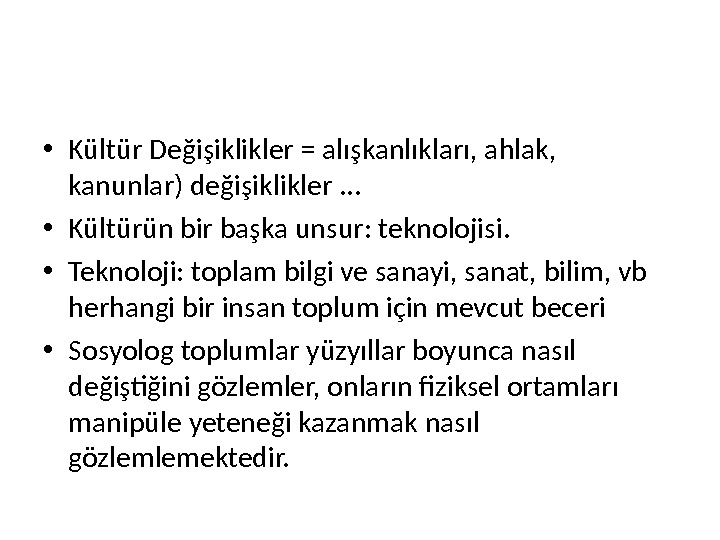
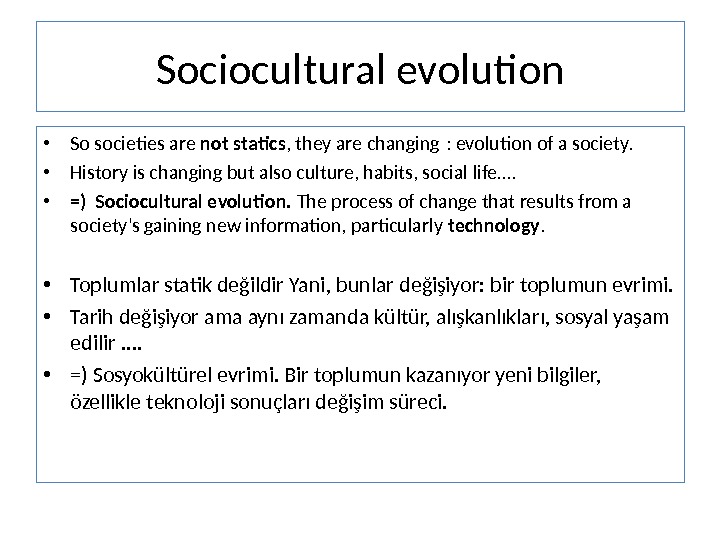
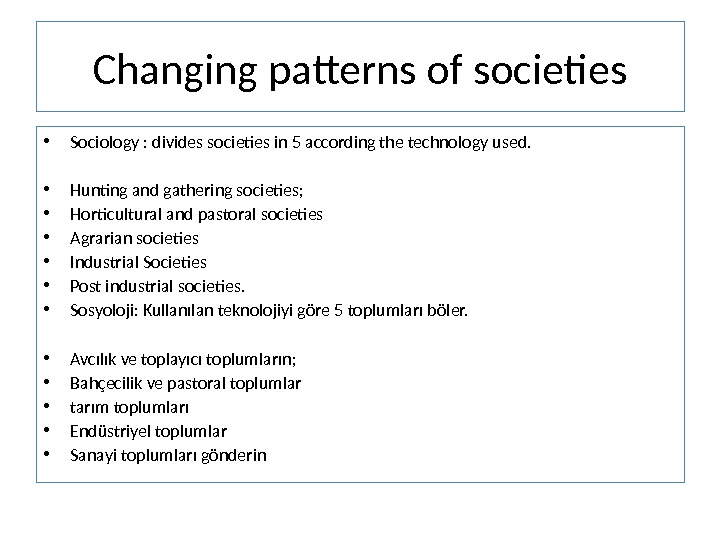
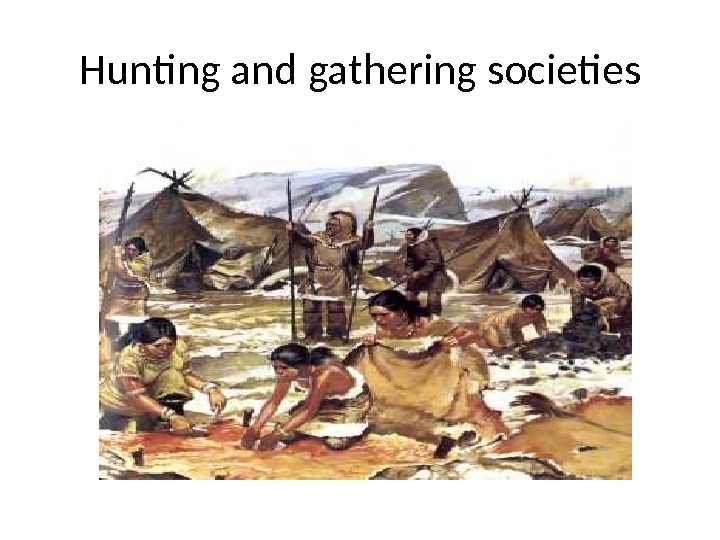


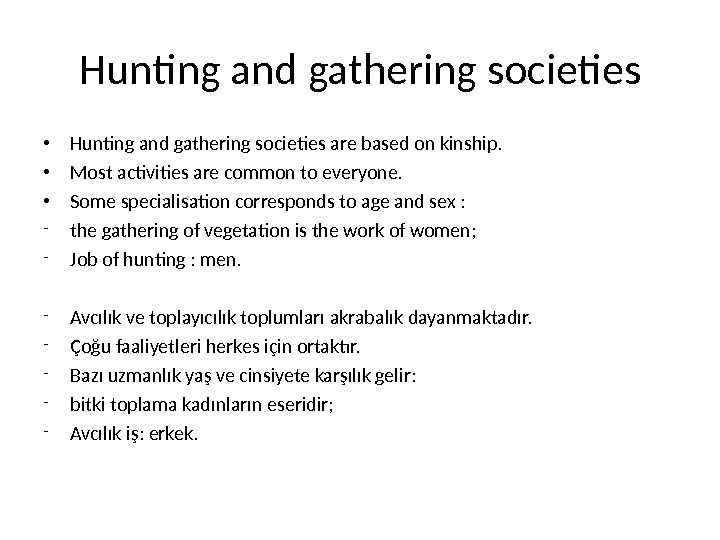
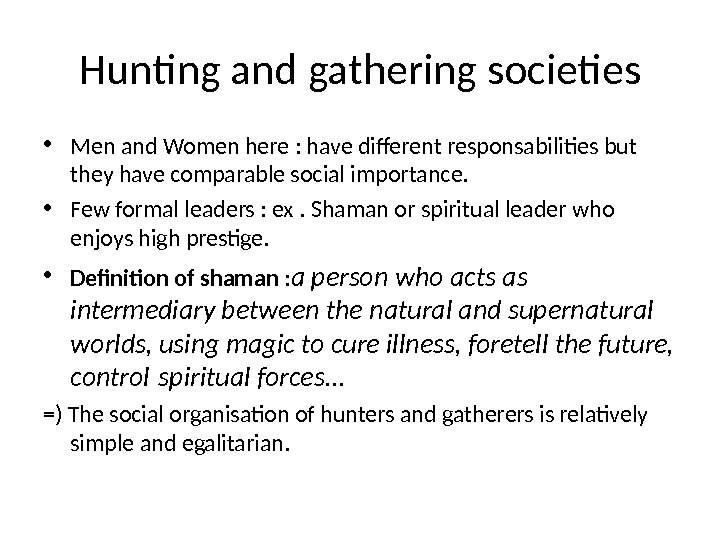
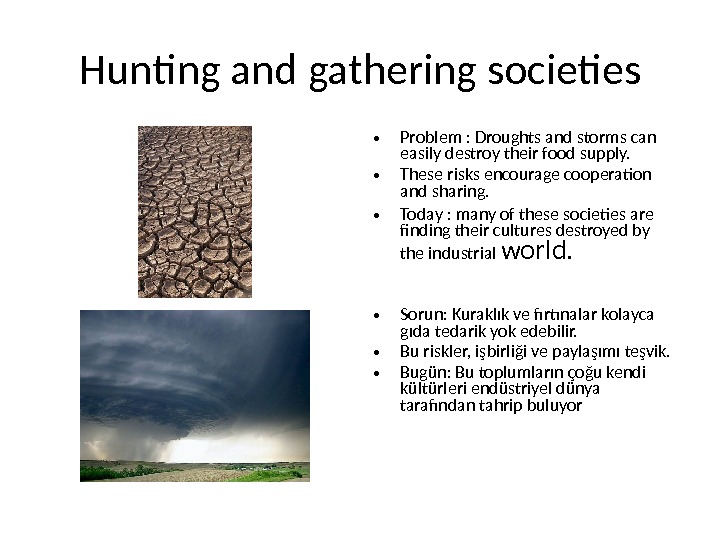
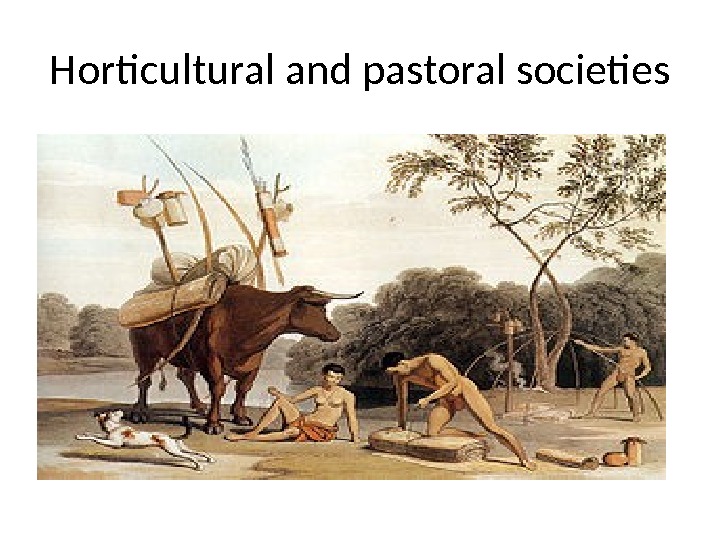

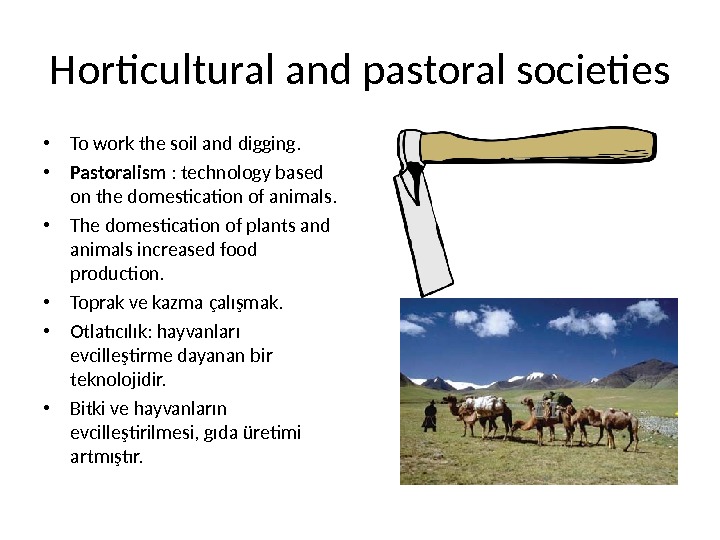


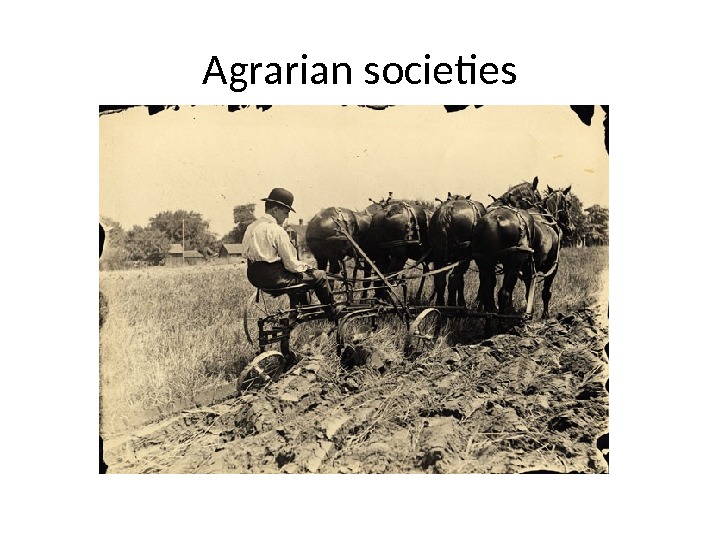
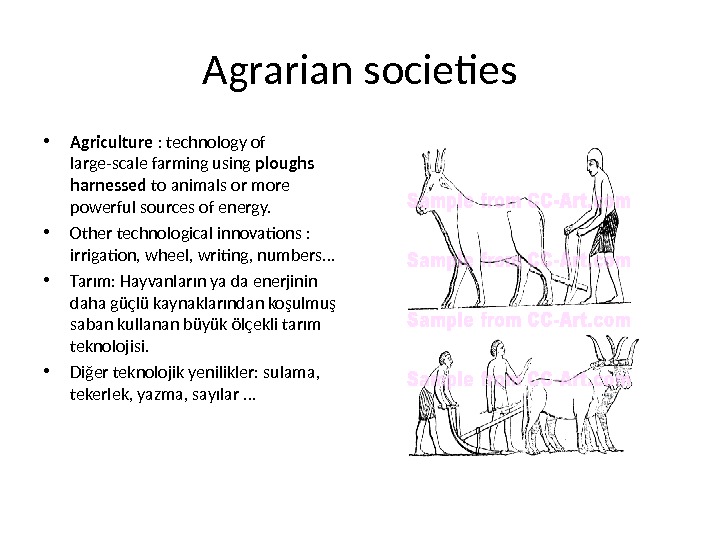



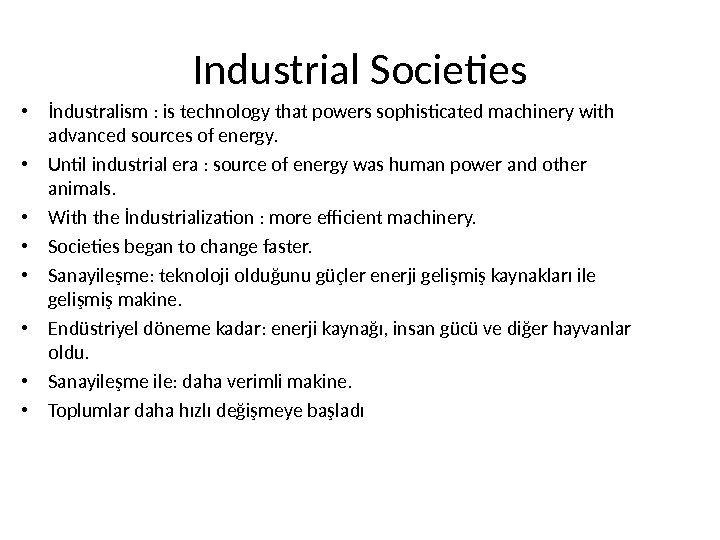



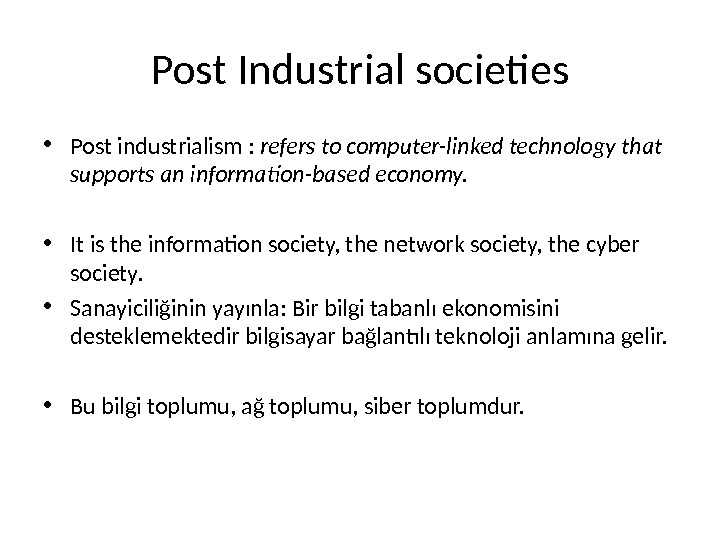
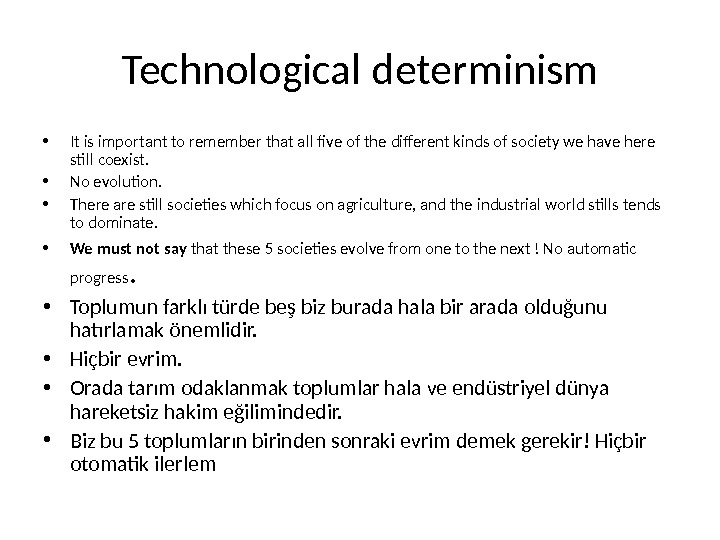
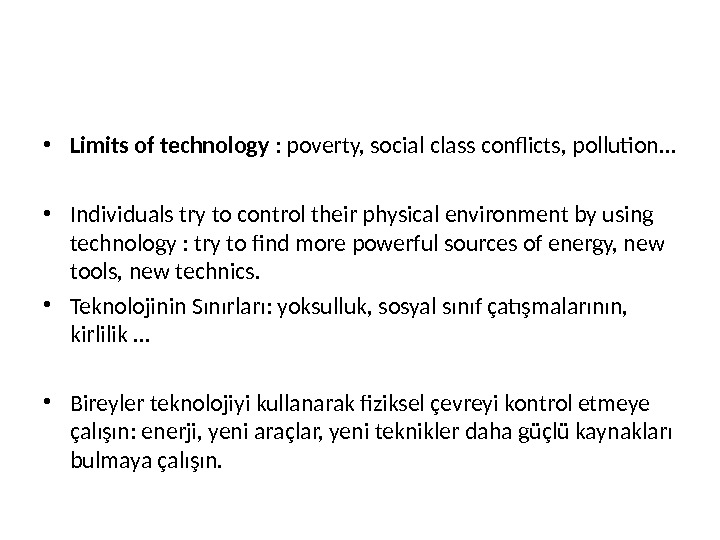
changing_patterns_of_society-technology.ppt
- Размер: 644.5 Кб
- Количество слайдов: 33
Описание презентации Changing patterns of society Changing patterns of по слайдам
 Changing patterns of society
Changing patterns of society
 Changing patterns of society • Sociology was born out of a concern with rapidly changing character of this modern, industrial world. • New technologies, growth of cities, rise of democratic politics =) changing shape of contemporary world. • The concept of society refers to people who interact in a defined space and share culture.
Changing patterns of society • Sociology was born out of a concern with rapidly changing character of this modern, industrial world. • New technologies, growth of cities, rise of democratic politics =) changing shape of contemporary world. • The concept of society refers to people who interact in a defined space and share culture.
 • Sosyoloji hızla bu modern endüstriyel dünya karakteri değişen bir endişe doğdu. • Yeni teknolojiler, kentlerin büyümesi, demokratik siyaset = yükselişi) çağdaş dünyanın şekli değişiyor. • Toplum kavramı tanımlanmış bir boşluk ve paylaşım kültürü etkileşim insanlar anlamına gelir.
• Sosyoloji hızla bu modern endüstriyel dünya karakteri değişen bir endişe doğdu. • Yeni teknolojiler, kentlerin büyümesi, demokratik siyaset = yükselişi) çağdaş dünyanın şekli değişiyor. • Toplum kavramı tanımlanmış bir boşluk ve paylaşım kültürü etkileşim insanlar anlamına gelir.
 Changing patterns of Society • Culture : Culture is one of the most important and basic concepts of sociology. In sociology, culture has a specific meaning. • In other words the behavior which is transmitted to us by someone is called culture. The way of living, eating, wearing, singing, dancing and talking is all parts of a culture. • Kültür: Kültür sosyolojisinin en önemli ve temel kavramlardan biridir. Sosyoloji, kültür belli bir anlamı vardır. • Diğer bir deyişle birileri tarafından bize iletilen davranış kültürü denir. Yaşam yolu, yeme giyen, şarkı, dans ve konuşan bir kültürün tüm parçaları.
Changing patterns of Society • Culture : Culture is one of the most important and basic concepts of sociology. In sociology, culture has a specific meaning. • In other words the behavior which is transmitted to us by someone is called culture. The way of living, eating, wearing, singing, dancing and talking is all parts of a culture. • Kültür: Kültür sosyolojisinin en önemli ve temel kavramlardan biridir. Sosyoloji, kültür belli bir anlamı vardır. • Diğer bir deyişle birileri tarafından bize iletilen davranış kültürü denir. Yaşam yolu, yeme giyen, şarkı, dans ve konuşan bir kültürün tüm parçaları.
 • Culture is a system of learned behavior shared by and transmitted among the members of a group. • Kültür: Kültür sosyolojisinin en Önemli kavramlardan biridir Temel ettik. Sosyoloji, Kültür belli Bir Anlamı vardir. • Diğer Bir deyişle Birileri Tarafından Gerçekleştirilme Bize iletilen DAVRANIŞ Kültürü denir. Yaşam Yolu, yeme Giyen, şarkı, dans Konuşan Bir kültürün TÜM PARÇALARI ettik. • E. B. Tylor defines «Culture is that complex whole which includes knowledge, belief, art, morals, law, customs and any other capabilities and habits acquired by man as a member of society «.
• Culture is a system of learned behavior shared by and transmitted among the members of a group. • Kültür: Kültür sosyolojisinin en Önemli kavramlardan biridir Temel ettik. Sosyoloji, Kültür belli Bir Anlamı vardir. • Diğer Bir deyişle Birileri Tarafından Gerçekleştirilme Bize iletilen DAVRANIŞ Kültürü denir. Yaşam Yolu, yeme Giyen, şarkı, dans Konuşan Bir kültürün TÜM PARÇALARI ettik. • E. B. Tylor defines «Culture is that complex whole which includes knowledge, belief, art, morals, law, customs and any other capabilities and habits acquired by man as a member of society «.
 • E. B. Tylor «Kültür olduğu bilgi, inanç, sanat, ahlak, hukuk, gelenek ve toplumun bir üyesi olarak insan tarafından satın alınan herhangi bir diğer yetenekleri ve alışkanlıkları içeren karmaşık bütün» tanımlı
• E. B. Tylor «Kültür olduğu bilgi, inanç, sanat, ahlak, hukuk, gelenek ve toplumun bir üyesi olarak insan tarafından satın alınan herhangi bir diğer yetenekleri ve alışkanlıkları içeren karmaşık bütün» tanımlı
 • Changes in culture =) changes in habits, morality, laws… • Another element of culture : technology. • Technology: the total knowledge and skills available to any human society for industry, art, science, etc. • Sociologist observes how societies change over centuries, observes how they gain ability to manipulate their physical environments.
• Changes in culture =) changes in habits, morality, laws… • Another element of culture : technology. • Technology: the total knowledge and skills available to any human society for industry, art, science, etc. • Sociologist observes how societies change over centuries, observes how they gain ability to manipulate their physical environments.
 • Kültür Değişiklikler = alışkanlıkları, ahlak, kanunlar) değişiklikler. . . • Kültürün bir başka unsur: teknolojisi. • Teknoloji: toplam bilgi ve sanayi, sanat, bilim, vb herhangi bir insan toplum için mevcut beceri • Sosyolog toplumlar yüzyıllar boyunca nasıl değiştiğini gözlemler, onların fiziksel ortamları manipüle yeteneği kazanmak nasıl gözlemlemektedir.
• Kültür Değişiklikler = alışkanlıkları, ahlak, kanunlar) değişiklikler. . . • Kültürün bir başka unsur: teknolojisi. • Teknoloji: toplam bilgi ve sanayi, sanat, bilim, vb herhangi bir insan toplum için mevcut beceri • Sosyolog toplumlar yüzyıllar boyunca nasıl değiştiğini gözlemler, onların fiziksel ortamları manipüle yeteneği kazanmak nasıl gözlemlemektedir.
 Sociocultural evolution • So societies are not statics , they are changing : evolution of a society. • History is changing but also culture, habits, social life…. • =) Sociocultural evolution. The process of change that results from a society’s gaining new information, particularly technology. • Toplumlar statik değildir Yani, bunlar değişiyor: bir toplumun evrimi. • Tarih değişiyor ama aynı zamanda kültür, alışkanlıkları, sosyal yaşam edilir. . • =) Sosyokültürel evrimi. Bir toplumun kazanıyor yeni bilgiler, özellikle teknoloji sonuçları değişim süreci.
Sociocultural evolution • So societies are not statics , they are changing : evolution of a society. • History is changing but also culture, habits, social life…. • =) Sociocultural evolution. The process of change that results from a society’s gaining new information, particularly technology. • Toplumlar statik değildir Yani, bunlar değişiyor: bir toplumun evrimi. • Tarih değişiyor ama aynı zamanda kültür, alışkanlıkları, sosyal yaşam edilir. . • =) Sosyokültürel evrimi. Bir toplumun kazanıyor yeni bilgiler, özellikle teknoloji sonuçları değişim süreci.
 Changing patterns of societies • Sociology : divides societies in 5 according the technology used. • Hunting and gathering societies; • Horticultural and pastoral societies • Agrarian societies • Industrial Societies • Post industrial societies. • Sosyoloji: Kullanılan teknolojiyi göre 5 toplumları böler. • Avcılık ve toplayıcı toplumların; • Bahçecilik ve pastoral toplumlar • tarım toplumları • Endüstriyel toplumlar • Sanayi toplumları gönderin
Changing patterns of societies • Sociology : divides societies in 5 according the technology used. • Hunting and gathering societies; • Horticultural and pastoral societies • Agrarian societies • Industrial Societies • Post industrial societies. • Sosyoloji: Kullanılan teknolojiyi göre 5 toplumları böler. • Avcılık ve toplayıcı toplumların; • Bahçecilik ve pastoral toplumlar • tarım toplumları • Endüstriyel toplumlar • Sanayi toplumları gönderin
 Hunting and gathering societies
Hunting and gathering societies
 Hunting and gathering societies • Hunting and gathering refers to simple technology for hunting animals and gathering vegetation. • Hunting and gathering societies remained common several centuries ago but today : in sharp decline. • Ravaged by advance of industrial societies. • Avcılık ve toplayıcılık av hayvanları ve bitki toplamak için basit bir teknoloji anlamına gelir. • Avcılık ve toplayıcılık toplumları birkaç yüzyıl önce yaygın kalır ama bugün: keskin düşüş. • Endüstriyel toplumların önceden tarafından yağmalandı.
Hunting and gathering societies • Hunting and gathering refers to simple technology for hunting animals and gathering vegetation. • Hunting and gathering societies remained common several centuries ago but today : in sharp decline. • Ravaged by advance of industrial societies. • Avcılık ve toplayıcılık av hayvanları ve bitki toplamak için basit bir teknoloji anlamına gelir. • Avcılık ve toplayıcılık toplumları birkaç yüzyıl önce yaygın kalır ama bugün: keskin düşüş. • Endüstriyel toplumların önceden tarafından yağmalandı.
 Hunting and gathering societies • İndigenous peoples : peoples with ties to the land, wter and wildlife of their ancestral domain. Ex : Semai of Malaysia, The Maori of New Zealand. . . • These groups were also nomadic : “ a group of people who have no fixed home and move according to the seasons from place to place in search of food, water, and grazing land. ” • Yerli halklar: toprak, su ve atalarının etki yaban hayatı ile bağları olan halklar. Örn: Malezya, Yeni Zelanda Maori Semai. . . • Bu gruplar, aynı zamanda göçebe: «sabit ev ve gıda, su ve otlak arayışı içinde bir yerden bir yere mevsimlere göre hareket bir grup insan
Hunting and gathering societies • İndigenous peoples : peoples with ties to the land, wter and wildlife of their ancestral domain. Ex : Semai of Malaysia, The Maori of New Zealand. . . • These groups were also nomadic : “ a group of people who have no fixed home and move according to the seasons from place to place in search of food, water, and grazing land. ” • Yerli halklar: toprak, su ve atalarının etki yaban hayatı ile bağları olan halklar. Örn: Malezya, Yeni Zelanda Maori Semai. . . • Bu gruplar, aynı zamanda göçebe: «sabit ev ve gıda, su ve otlak arayışı içinde bir yerden bir yere mevsimlere göre hareket bir grup insan
 Hunting and gathering societies • Hunting and gathering societies are based on kinship. • Most activities are common to everyone. • Some specialisation corresponds to age and sex : — the gathering of vegetation is the work of women; — Job of hunting : men. — Avcılık ve toplayıcılık toplumları akrabalık dayanmaktadır. — Çoğu faaliyetleri herkes için ortaktır. — Bazı uzmanlık yaş ve cinsiyete karşılık gelir: — bitki toplama kadınların eseridir; — Avcılık iş: erkek.
Hunting and gathering societies • Hunting and gathering societies are based on kinship. • Most activities are common to everyone. • Some specialisation corresponds to age and sex : — the gathering of vegetation is the work of women; — Job of hunting : men. — Avcılık ve toplayıcılık toplumları akrabalık dayanmaktadır. — Çoğu faaliyetleri herkes için ortaktır. — Bazı uzmanlık yaş ve cinsiyete karşılık gelir: — bitki toplama kadınların eseridir; — Avcılık iş: erkek.
 Hunting and gathering societies • Men and Women here : have different responsabilities but they have comparable social importance. • Few formal leaders : ex. Shaman or spiritual leader who enjoys high prestige. • Definition of shaman : a person who acts as intermediary between the natural and supernatural worlds, using magic to cure illness, foretell the future, control spiritual forces. . . =) The social organisation of hunters and gatherers is relatively simple and egalitarian.
Hunting and gathering societies • Men and Women here : have different responsabilities but they have comparable social importance. • Few formal leaders : ex. Shaman or spiritual leader who enjoys high prestige. • Definition of shaman : a person who acts as intermediary between the natural and supernatural worlds, using magic to cure illness, foretell the future, control spiritual forces. . . =) The social organisation of hunters and gatherers is relatively simple and egalitarian.
 Hunting and gathering societies • Problem : Droughts and storms can easily destroy their food supply. • These risks encourage cooperation and sharing. • Today : many of these societies are finding their cultures destroyed by the industrial world. • Sorun: Kuraklık ve fırtınalar kolayca gıda tedarik yok edebilir. • Bu riskler, işbirliği ve paylaşımı teşvik. • Bugün: Bu toplumların çoğu kendi kültürleri endüstriyel dünya tarafından tahrip buluyor
Hunting and gathering societies • Problem : Droughts and storms can easily destroy their food supply. • These risks encourage cooperation and sharing. • Today : many of these societies are finding their cultures destroyed by the industrial world. • Sorun: Kuraklık ve fırtınalar kolayca gıda tedarik yok edebilir. • Bu riskler, işbirliği ve paylaşımı teşvik. • Bugün: Bu toplumların çoğu kendi kültürleri endüstriyel dünya tarafından tahrip buluyor
 Horticultural and pastoral societies
Horticultural and pastoral societies
 Horticultural and pastoral societies • Horticultural : is the science, art, technology and business involved in intensive plant cultivation for human use • Pastoral : Of or relating to shepherds. (a person who herds, tends, and guards sheep. ) • Horticulture is technology based on using hand tools to cultivate plants. • The most important tool : the Hoe. • Bahçe Bitkileri: insan kullanımı için yoğun bitki yetiştiriciliğinde katılan bilim, sanat, teknoloji ve iş • Pastoral: Of ya da çobanların ilgili. (Sürüler, eğilimindedir, ve gardiyanlar koyun kişi. ) • Bahçe Bitkileri bitkileri yetiştirmek için el aletlerini kullanarak tabanlı bir teknolojidir. • En önemli aracı: Hoe
Horticultural and pastoral societies • Horticultural : is the science, art, technology and business involved in intensive plant cultivation for human use • Pastoral : Of or relating to shepherds. (a person who herds, tends, and guards sheep. ) • Horticulture is technology based on using hand tools to cultivate plants. • The most important tool : the Hoe. • Bahçe Bitkileri: insan kullanımı için yoğun bitki yetiştiriciliğinde katılan bilim, sanat, teknoloji ve iş • Pastoral: Of ya da çobanların ilgili. (Sürüler, eğilimindedir, ve gardiyanlar koyun kişi. ) • Bahçe Bitkileri bitkileri yetiştirmek için el aletlerini kullanarak tabanlı bir teknolojidir. • En önemli aracı: Hoe
 Horticultural and pastoral societies • To work the soil and digging. • Pastoralism : technology based on the domestication of animals. • The domestication of plants and animals increased food production. • Toprak ve kazma çalışmak. • Otlatıcılık: hayvanları evcilleştirme dayanan bir teknolojidir. • Bitki ve hayvanların evcilleştirilmesi, gıda üretimi artmıştır.
Horticultural and pastoral societies • To work the soil and digging. • Pastoralism : technology based on the domestication of animals. • The domestication of plants and animals increased food production. • Toprak ve kazma çalışmak. • Otlatıcılık: hayvanları evcilleştirme dayanan bir teknolojidir. • Bitki ve hayvanların evcilleştirilmesi, gıda üretimi artmıştır.
 Horticultural and pastoral societies • Horticulturalists formed settlements. • Trade • Domesticating plants and animals generates a material surplus (more ressources) =) complex social arrangements. Çiftçilik yerleşim kurdu. ticaret Bitki ve hayvanları evcilleştirmeye bir malzeme fazla üretir (daha fazla kaynakların bulunduğu, ) =) Karmaşık sosyal düzenlemeler
Horticultural and pastoral societies • Horticulturalists formed settlements. • Trade • Domesticating plants and animals generates a material surplus (more ressources) =) complex social arrangements. Çiftçilik yerleşim kurdu. ticaret Bitki ve hayvanları evcilleştirmeye bir malzeme fazla üretir (daha fazla kaynakların bulunduğu, ) =) Karmaşık sosyal düzenlemeler
 Horticultural and pastoral societies • Problem : Social inequality. • Expanding productive technology intensifies social inequality. • Some families produce more food than others. =) they assume positions of relative power and privilege. Sorun: Toplumsal eşitsizlik. Verimli teknoloji genişleyen sosyal eşitsizliği yoğunlaşıyor. Bazı aileler diğerlerinden daha fazla gıda üretmek. =) Onlar göreli güç ve ayrıcalık pozisyonları varsayalım.
Horticultural and pastoral societies • Problem : Social inequality. • Expanding productive technology intensifies social inequality. • Some families produce more food than others. =) they assume positions of relative power and privilege. Sorun: Toplumsal eşitsizlik. Verimli teknoloji genişleyen sosyal eşitsizliği yoğunlaşıyor. Bazı aileler diğerlerinden daha fazla gıda üretmek. =) Onlar göreli güç ve ayrıcalık pozisyonları varsayalım.
 Agrarian societies
Agrarian societies
 Agrarian societies • Agriculture : technology of large-scale farming using ploughs harnessed to animals or more powerful sources of energy. • Other technological innovations : irrigation, wheel, writing, numbers. . . • Tarım: Hayvanların ya da enerjinin daha güçlü kaynaklarından koşulmuş saban kullanan büyük ölçekli tarım teknolojisi. • Diğer teknolojik yenilikler: sulama, tekerlek, yazma, sayılar. . .
Agrarian societies • Agriculture : technology of large-scale farming using ploughs harnessed to animals or more powerful sources of energy. • Other technological innovations : irrigation, wheel, writing, numbers. . . • Tarım: Hayvanların ya da enerjinin daha güçlü kaynaklarından koşulmuş saban kullanan büyük ölçekli tarım teknolojisi. • Diğer teknolojik yenilikler: sulama, tekerlek, yazma, sayılar. . .
 Agrarian societies • Specialisation in work • İnvention of money as a common standard of exchange. • Money facilitated trade, sparking the growth of cities as economic centres. • Problem : dramatic social inequality, peasants and slaves constitue a significant share of the population and labour for elites. • Çalışmalarında Uzmanlık • Döviz, ortak bir standart olarak para icat. • Para ekonomik merkezleri olarak şehirlerin büyümesi kıvılcım, ticaret kolaylaştırdı. • Sorun: dramatik toplumsal eşitsizlik, köylüler ve köleler seçkinler için nüfus ve işgücü önemli bir paya sahip.
Agrarian societies • Specialisation in work • İnvention of money as a common standard of exchange. • Money facilitated trade, sparking the growth of cities as economic centres. • Problem : dramatic social inequality, peasants and slaves constitue a significant share of the population and labour for elites. • Çalışmalarında Uzmanlık • Döviz, ortak bir standart olarak para icat. • Para ekonomik merkezleri olarak şehirlerin büyümesi kıvılcım, ticaret kolaylaştırdı. • Sorun: dramatik toplumsal eşitsizlik, köylüler ve köleler seçkinler için nüfus ve işgücü önemli bir paya sahip.
 Agrarian societies • Elites: are free, they can devote their time to the study of philosophy, art and literature. • Women are the primary providers of food. • The development of Agriculture propelled men into a position of social dominance. • =) These advanced technologies have increased human control aver the natural world. • Elitler: Onlar felsefe, sanat ve edebiyat çalışmaya vakit ayırabilirim, ücretsizdir. • Kadın gıda birincil sağlayıcıları vardır. • Tarım gelişimi sosyal baskınlık bir konuma erkekler yürür. • =) Bu gelişmiş teknolojiler doğal dünyada insan kontrolü artmıştır
Agrarian societies • Elites: are free, they can devote their time to the study of philosophy, art and literature. • Women are the primary providers of food. • The development of Agriculture propelled men into a position of social dominance. • =) These advanced technologies have increased human control aver the natural world. • Elitler: Onlar felsefe, sanat ve edebiyat çalışmaya vakit ayırabilirim, ücretsizdir. • Kadın gıda birincil sağlayıcıları vardır. • Tarım gelişimi sosyal baskınlık bir konuma erkekler yürür. • =) Bu gelişmiş teknolojiler doğal dünyada insan kontrolü artmıştır
 Industrial Societies
Industrial Societies
 Industrial Societies • İndustralism : is technology that powers sophisticated machinery with advanced sources of energy. • Until industrial era : source of energy was human power and other animals. • With the İndustrialization : more efficient machinery. • Societies began to change faster. • Sanayileşme: teknoloji olduğunu güçler enerji gelişmiş kaynakları ile gelişmiş makine. • Endüstriyel döneme kadar: enerji kaynağı, insan gücü ve diğer hayvanlar oldu. • Sanayileşme ile: daha verimli makine. • Toplumlar daha hızlı değişmeye başladı
Industrial Societies • İndustralism : is technology that powers sophisticated machinery with advanced sources of energy. • Until industrial era : source of energy was human power and other animals. • With the İndustrialization : more efficient machinery. • Societies began to change faster. • Sanayileşme: teknoloji olduğunu güçler enerji gelişmiş kaynakları ile gelişmiş makine. • Endüstriyel döneme kadar: enerji kaynağı, insan gücü ve diğer hayvanlar oldu. • Sanayileşme ile: daha verimli makine. • Toplumlar daha hızlı değişmeye başladı
 Industrial Societies • 1900’s: railways and steamships revolutionised transportation • 20 th century : electricity, electronic communication, telephone, radio and television. • =) the large world seem smaller and smaller. • 1900: demiryolları ve buharlı gemiler ulaşım devrim • 20. yüzyıl: Elektrik, elektronik haberleşme, telefon, radyo ve televizyon. • =) Büyük bir dünya daha küçük ve daha küçük görünüyor
Industrial Societies • 1900’s: railways and steamships revolutionised transportation • 20 th century : electricity, electronic communication, telephone, radio and television. • =) the large world seem smaller and smaller. • 1900: demiryolları ve buharlı gemiler ulaşım devrim • 20. yüzyıl: Elektrik, elektronik haberleşme, telefon, radyo ve televizyon. • =) Büyük bir dünya daha küçük ve daha küçük görünüyor
 Industrial Societies • Work too has changed : inequalities. • Unparalleled prosperity. • Poverty remains a serious problem in industrial societies. • Çalışma çok değişti: eşitsizlikleri. • Eşsiz refah. • Yoksulluk endüstriyel toplumlarda ciddi bir sorun olmaya devam
Industrial Societies • Work too has changed : inequalities. • Unparalleled prosperity. • Poverty remains a serious problem in industrial societies. • Çalışma çok değişti: eşitsizlikleri. • Eşsiz refah. • Yoksulluk endüstriyel toplumlarda ciddi bir sorun olmaya devam
 Post Industrial societies
Post Industrial societies
 Post Industrial societies • Post industrialism : refers to computer-linked technology that supports an information-based economy. • It is the information society, the network society, the cyber society. • Sanayiciliğinin yayınla: Bir bilgi tabanlı ekonomisini desteklemektedir bilgisayar bağlantılı teknoloji anlamına gelir. • Bu bilgi toplumu, ağ toplumu, siber toplumdur.
Post Industrial societies • Post industrialism : refers to computer-linked technology that supports an information-based economy. • It is the information society, the network society, the cyber society. • Sanayiciliğinin yayınla: Bir bilgi tabanlı ekonomisini desteklemektedir bilgisayar bağlantılı teknoloji anlamına gelir. • Bu bilgi toplumu, ağ toplumu, siber toplumdur.
 Technological determinism • It is important to remember that all five of the different kinds of society we have here still coexist. • No evolution. • There are still societies which focus on agriculture, and the industrial world stills tends to dominate. • We must not say that these 5 societies evolve from one to the next ! No automatic progress. • Toplumun farklı türde beş biz burada hala bir arada olduğunu hatırlamak önemlidir. • Hiçbir evrim. • Orada tarım odaklanmak toplumlar hala ve endüstriyel dünya hareketsiz hakim eğilimindedir. • Biz bu 5 toplumların birinden sonraki evrim demek gerekir! Hiçbir otomatik ilerlem
Technological determinism • It is important to remember that all five of the different kinds of society we have here still coexist. • No evolution. • There are still societies which focus on agriculture, and the industrial world stills tends to dominate. • We must not say that these 5 societies evolve from one to the next ! No automatic progress. • Toplumun farklı türde beş biz burada hala bir arada olduğunu hatırlamak önemlidir. • Hiçbir evrim. • Orada tarım odaklanmak toplumlar hala ve endüstriyel dünya hareketsiz hakim eğilimindedir. • Biz bu 5 toplumların birinden sonraki evrim demek gerekir! Hiçbir otomatik ilerlem
 • Limits of technology : poverty, social class conflicts, pollution… • Individuals try to control their physical environment by using technology : try to find more powerful sources of energy, new tools, new technics. • Teknolojinin Sınırları: yoksulluk, sosyal sınıf çatışmalarının, kirlilik. . . • Bireyler teknolojiyi kullanarak fiziksel çevreyi kontrol etmeye çalışın: enerji, yeni araçlar, yeni teknikler daha güçlü kaynakları bulmaya çalışın.
• Limits of technology : poverty, social class conflicts, pollution… • Individuals try to control their physical environment by using technology : try to find more powerful sources of energy, new tools, new technics. • Teknolojinin Sınırları: yoksulluk, sosyal sınıf çatışmalarının, kirlilik. . . • Bireyler teknolojiyi kullanarak fiziksel çevreyi kontrol etmeye çalışın: enerji, yeni araçlar, yeni teknikler daha güçlü kaynakları bulmaya çalışın.

